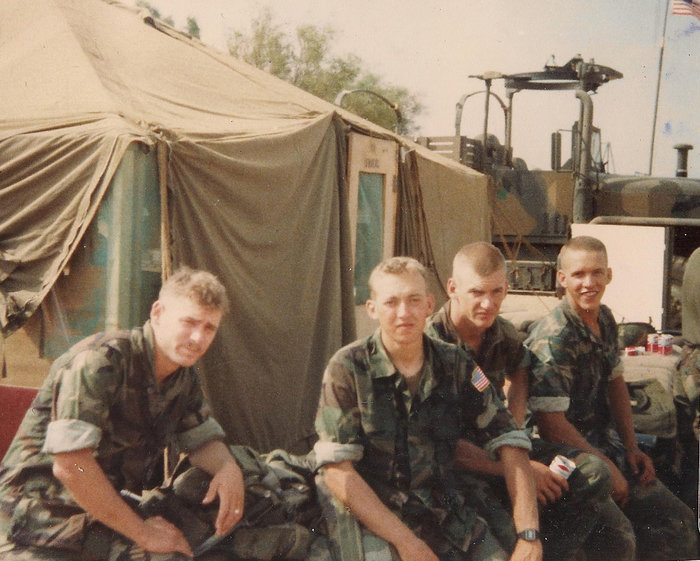Frank W. Comes was 18 years old when he joined the U.S. Marines. A Bayonne native, he was 21 when he was assigned as part of an American peacekeeping force to Lebanon, where he managed to survive one of the most horrific attacks on Americans in history: The terrorist attack on the U.S. Marine barracks in Beirut, Lebanon, which resulted in the deaths of 241 people.
His family called it a miracle that he survived, and hoped for another miracle 30 years later when Comes was struck by cancer. He died on Oct. 9 a few weeks short of the 30th anniversary of the attack.
In 1983, Marines from the 24th amphibious unit out of Camp Lejeune, North Carolina, were sent over there,” said Frank G. Comes, his father. “My son was one of them. No sooner did the Marines get there then they found themselves at war. Every day they were fighting for their lives. Then on Oct. 23, 1983, a truck carrying thousands of pounds of explosives crashed into the barracks killing 241 men, 221 of these were Marines.”
More than 100 other people were wounded in the attack.
This was the most Marines killed in one day since the first day of the Iwo Jima landing during World War II, and is seen as one of the first terrorist attacks on U.S. citizens.
Among the dead were seven Marines from New Jersey that included William Burley from Linden, Sean Estler from Kenall Park, Paul Innocenzi from Trenton, James Langon from Lakehurst, Jeffrey Young from Moorestown, Dramis George from Cape May Court House, and Manuel Cox from Union City.
When the reports reached the United States, Comes family, who lived in Jersey City at the time, did not know if he was dead or alive, although they had heard that some of the boys from New Jersey had died. The family knew that men from other parts of Hudson County also served in that unit, including someone from West New York. They were relieved finally to find out young Comes had survived.
“My son survived that but lost his life to cancer,” his father said. “Like the Marine he was he fought every single day to stay alive.”
Comes clung to life for weeks in the apparent hope of surviving long enough to see the 30th anniversary.
“He was 52 when he died,” his father said. “All the Marines that served there were heroes and those that died are fallen heroes. They should be remembered and honored like all our veterans.”
The elder Comes said a month and a half after the attack the Marines were pulled out.
Many see them as the first victims of terrorism, and for him and others, Oct. 30, 1983 is a marker in history similar to Sept. 11, 2001.
The bombing is considered the most deadly act of terrorism prior to Sept. 11, 2001 when terrorists attacked the World Trade Center and the Pentagon.
The elder Comes said there was never any punishment for the terrorists who committed the 1983 attack, but he says that Americans owe a debt of gratitude to those like his son who served to protect America.
“In the Marine Corps we have a saying Semper Fidelis which means Always Faithful,” he said.
The elder Comes also served in the U.S. Marine Corps from 1956 to 1958, during which time Marines were also sent to Lebanon.
“My detachment was supposed to go over, but they pulled us back,” he said. “And years later, my son winds up over there.”
While in his senior year in high school, the young Comes came to his father saying, “Hey Dad, I’m going in the Marines.”
“Being an ex-Marine I was proud,” the elder Comes said. “I told him it’s a rough outfit. He said he didn’t’ care, he wanted to go in. So he went.”
Being in the Marines was something of a family tradition. Not only did the elder Comes serve, but so did his brother, who served in the Marines during the Korean War.
After his death from cancer, the younger Comes was buried with full military honors. He had received commendations for his service including the Navy Marine Corps Commendation Medal.
“I never knew it,” the elder Comes said. “He never told us anything.”
In the weeks following the attack, The Bayonne Detachment of the Marine Corps League raised money to help honor the fallen and sent care packages to the survivors.
Although the death of his son comes very close to the 30th anniversary of the attack, the elder Comes said he is not looking for publicity for his son, but to have Americans remember all those who had served during that time and to have them appreciate the sacrifices men like his son made on their behalf.
“It was a miracle that my son survived back in 1983,” the elder Comes said. “We were hoping for a second miracle that would allow him to survive cancer. But sometimes, you only get one miracle in a lifetime.”
Al Sullivan may be reached at asullivan@hudsonreporter.com.
